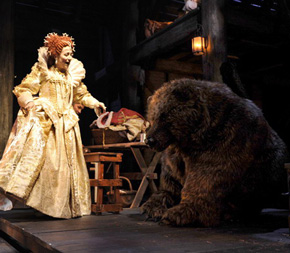
Timothy Findley's Elizabeth Rex proposes a dialogue between Her Royal Highness, Queen Elizabeth I, and the members of the Lord Chamberlain's Men—William Shakespeare's troupe—on a troubled night when the crown weighs heavily on its wearer. The underlying theme of their discussion, however, is the stress of denying your true nature: The monarch must be unflinching in her rule, even to ordering the execution of her dearest friend. The sensitive poet who pours his heart into his words must conceal his inner affections. Then there is Ned Lowenscroft, the actor who earns his living by playing women's roles in those days when only males were permitted on the stage.
Ironically, the most potent symbol for the perverse restrictions imposed by a society of cruder sensibilities than our own is a non-human character—a full-grown bear, once a captive participant in the cruel blood-sport called "bear-baiting"—attacked by packs of dogs, with gentlemen wagering on which of the combatants would kill the other first—until Lowenscroft, taking pity on the ursine gladiator, bought it from its owner. Dubbed "Harry" by his liberator, this gentle beast now travels with the players. (When the resident playwright stipulated "exit, pursued by a bear" as a stage direction in The Winter's Tale, he knew already who would be cast as the pursuer.)
Clearly this is no juvenile-fiction Teddy, but a bruin of considerable dramatic gravitas. Says movement coach Janet Louer, "My training as a certified Laban movement analyst helped me understand the bear's physique in terms of the locomotion patterns—its center of gravity in its hindquarters, for example, and its neck as an extension of its shoulders. There's also the added factor of this bear being old, and having earlier been extremely abused—things also informing how it moves."
Ultimately, however, the responsibility for conveying the inner life of Harry Bear lies with actor Jude Roche: "After I was cast, I watched Animal Planet and every episode of The Grizzly Man Diaries that Netflix had in stock. I studied up on bear-baiting, too, in order to imagine his history, and the kinds of experiences that would determine his reactions to the sounds and body language of the people around him."
Compounding the difficulty of this task is the propensity of the costume (on loan from the Minneapolis' Guthrie Theatre) to mute emotional expression. "It's built on a quarter-inch metal frame and rubber poles capped with tennis balls—to indicate the joints—and padded in the back and all four legs," Roche reports, "Two forearm crutches extend my arms so that I can walk on all fours, one of which has a bicycle-brake connecting my hand to the bear's mouth so I can open it when he growls. Oh, and I wear a catcher's helmet with a metal rod connected to the inside of the head so I can move it up and down, and the whole suit is covered in fake fur. When I'm in full costume, I can barely see."
Bears are solitary by nature, but Harry must share the stage with a crowd of diverse personalities. He recognizes Lowenscroft as his special friend and protector, of course, but how do his companions respond to the presence of a 1500-pound mascot?
"The rest of the company approach Harry Bear as they might a big dog with the potential to snap. When they address him, they are direct, yet affectionate," Roche smiles, remembering, "Everyone has been patient with my limited vision—leading me on and off the stage, and petting me hard enough that I can feel it through the fur and react to it."
So it takes a village to raise a bear? "Yes, definitely! An animal of this caliber deserves the attention that would go into creating any character, and Harry is the child of many individuals," Roche concurs, "Janet helped me get the bear's movement down, Barbara [Gaines] fine-tuned the bear's behavior to give it more personality, and a team of incredibly talented women maintained the upkeep of the costume. Without everyone's collaborative effort, there would be no magic behind this one very beloved bear."
Elizabeth Rex plays at Chicago Shakespeare Theater through January 22.
Mary Shen Barnidge
Contributing Writer

 Follow Us On Twitter
Follow Us On Twitter